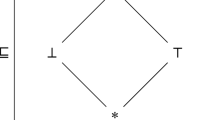Abstract
We define and study abstract valuation semantics for logics, an algebraically well-behaved version of valuation semantics. Then, in the context of the behavioral approach to the algebraization of logics, we show, by means of meaningful bridge theorems and application examples, that abstract valuations are suited to play a role similar to the one played by logical matrices in the traditional approach to algebraization.
Similar content being viewed by others
References
Avron, A., Non-deterministic matrices and modular semantics of rules, in J.-Y. Béziau, (ed.), Logica universalis, Birkhäuser Verlag, 2005, pp. 149–167.
Béziau, J.-Y., Classical negation can be expressed by one of its halves, Logic Journal of the IGPL 145–151, 1999.
Bidoit M., Hennicker R.: Behavioural theories and the proof of behavioural properties. Theoretical Computer Science 165(1), 3–55 (1996)
Blok, W., and D. Pigozzi, Algebraizable logics, Memoirs of the AMS 77:396, 1989.
Blok, W. J., and D. Pigozzi, Algebraic semantics for universal Horn logic without equality, in A. Romanowska, and J. D. H. Smith, (eds.), Universal algebra and quasigroup theory, Lect. Conf., Jadwisin/Pol. 1989, vol. 19 of Res. Expo. Math., Heldermann, 1992, pp. 1–56.
Bloom S. L.: Some theorems on structural consequence operations. Studia Logica 34, 1–9 (1975)
Caleiro, C., W. A. Carnielli, M. E. Coniglio, and J. Marcos, Two’s company: The humbug of many logical values, in J.-Y. Béziau, (ed.), Logica Universalis, Birkhäuser Verlag, 2005, pp. 169–189.
Caleiro, C., and R. Gonçalves, Algebraic valuations as behavioral logical matrices, in M. Kanazawa, H. Ono, and R. de Queiroz, (eds.), WoLLIC 2009, Selected Papers, vol. 5514 of Lecture Notes in Artificial Intelligence, Springer-Verlag, 2009, pp. 13–25.
Caleiro C., Gonçalves R.: Towards a behavioral algebraic theory of logical valuations. Fundamenta Informaticae 106(2-4), 191–209 (2011)
Caleiro, C., R. Gonc¸alves, and M. Martins, Behavioral algebraization of logics, Studia Logica 91 (1):63–111, 2009.
Czelakowski, J., Protoalgebraic logics, vol. 10 of Trends in Logic-Studia Logica Library, Kluwer Academic Publishers, 2001.
da Costa N., Béziau J.-Y.: Théorie de la valuation. Logique et Analyse 37(146), 95–117 (1994)
Diaconescu R.: On quasi-varieties of multiple valued logic models. Mathematical Logic Quarterly 57(2), 194–203 (2011)
Fiadeiro, J., and A. Sernadas, Structuring theories on consequence, in D. Sannella, and A. Tarlecki, (eds.), Recent Trends in Data Type Specification, vol. 332 of Lecture Notes in Computer Science, Springer-Verlag, 1988, pp. 44–72.
Font J.: Taking degrees of truth seriously. Studia Logica 91(3), 383–406 (2009)
Font, J., R. Jansana, and D. Pigozzi, A survey of abstract algebraic logic, Studia Logica (Special issue on Abstract Algebraic Logic, Part II) 74 (1-2):13–97, 2003. With an update in vol. 91:125–130, 2009.
Goguen J., Malcolm G.: A hidden agenda. Theoretical Computer Science 245(1), 55–101 (2000)
Herrmann, B., : Characterizing equivalential and algebraizable logics by the Leibniz operator. Studia Logica 58, 305–323 (1997)
Humberstone, L., : Béziau’s translation paradox. Theoria 71, 138–181 (1989)
Łoś J., Suszko R.: Remarks on sentential logics. Indagationes Mathematicae 20, 177–183 (1958)
Martins, M., Behavioral reasoning in generalized hidden logics, Phd Thesis, Faculdade de Cincias, University of Lisbon, 2004.
Martins M.: Closure properties for the class of behavioral models. Theoretical Computer Science 379(1-2), 53–83 (2007)
Martins M., Pigozzi D.: Behavioural reasoning for conditional equations. Mathematical Structures in Computer Science 17(5), 1075–1113 (2007)
Nelson D.: Constructible falsity. J. Symbolic Logic 14, 16–26 (1949)
Rasiowa, H., An algebraic approach to non-classical logics, Studies in logic and the foundations of mathematics, 78. Amsterdam : North-Holland, 1974, 1981.
Reichel, H., Behavioural validity of conditional equations in abstract data types, in Contributions to general algebra 3, Proc. Conf., Vienna 1984, 1985, pp. 301–324.
Roşu G.: Behavioral abstraction is hiding information. Theoretical Computer Science 327(1-2), 197–221 (2004)
Voutsadakis, G., Categorical abstract algebraic logic: Behavioral π-institutions, Studia Logica, (to appear).
Wójcicki, R., Theory of Logical Calculi, Synthese Library, Kluwer Academic Publishers, 1988.
Author information
Authors and Affiliations
Corresponding author
Rights and permissions
About this article
Cite this article
Caleiro, C., Gonçalves, R. Abstract Valuation Semantics. Stud Logica 101, 677–712 (2013). https://doi.org/10.1007/s11225-013-9495-2
Published:
Issue Date:
DOI: https://doi.org/10.1007/s11225-013-9495-2



